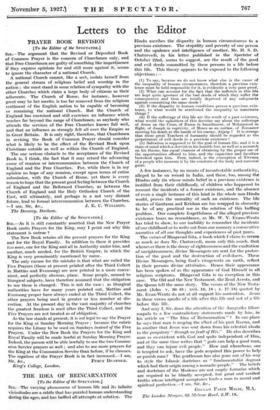Letters to the Editor
PRAYER BOOK REVISION
[To the Editor of the SPEcrxroa.]
SIR,—The argument that the Revised or Deposited Book of Common Prayer is the concern of Churchmen only, and that Free Churchmen are guilty of something like impertinence if they express opinions for and still more against it, seems to ignore the character of a national Church.
A national Church cannot, like a sect, isolate herself from the general stream of religious belief and worship in the nation ; she must stand in some relation of sympathy with the other Churches which claim a large body of citizens as their adherents. The Church of Rome, for instance, however great may be her merits, is too far removed from the religious sentiment of the English nation to be capable of becoming or remaining the national Church. But the Church of England has exercised and still exercises an influence which reaches far beyond the range of Churchmen, as anybody who attends the services of the Free Churches knows full well, and that an influence as strongly felt all over the Empire as in Great Britain. It is only right, therefore, that Churchmen in revising the Book of Common Prayer should consider what is likely to be the effect of the Revised Book upon Christians outside as well as within the Church of England.
The one serious obstacle to the acceptance of the Revised Book is, I think, the fact that it may retard the advancing cause of reunion or intercommunion between the Church of England and the Free Churches. For, while there is in my opinion no hope of any reunion, except upon terms of entire submission, with the Church of Rome, yet there is every reason to hope that the present good feeling between the Church of England and the Reformed Churches, as between the Church of England and the Holy Orthodox Church of the East, will ultimately, and perhaps in a not very distant future, lead to formal intercommunion between the Churches.


















































 Previous page
Previous page